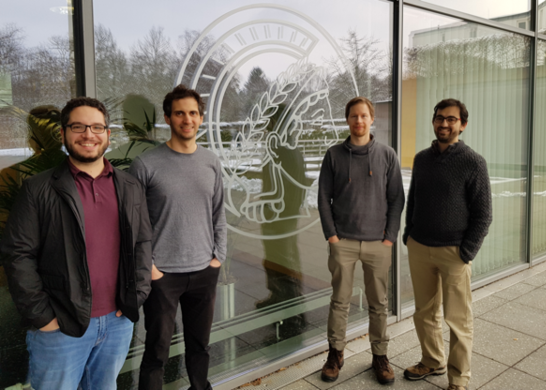
Four Postdoc researchers join the Physical Intelligence Department thanks to a Humboldt Postdoctoral Research Fellowship
- 22 February 2018
- Stuttgart
- Physical Intelligence
Each year, the Alexander von Humboldt Foundation grants approximately 500 fellowships to Postdoctoral Researchers of all nationalities and disciplines from abroad to continue their research in Germany. Four AvH fellows join the Max Planck Institute for Intelligent Systems in Stuttgart.
Dr. Utku Culha, Dr. Ville Liimatainen, Dr. Abdon Pena-Francesch and Dr. Zoey Davidson are thrilled to join the Physical Intelligence Department at the Max Planck Institute for Intelligent Systems in Stuttgart thanks to the Humboldt Postdoctoral Research Fellowship. "We are really glad to be here", says Culha, who joins the Physical Intelligence Department at the Max Planck Institute for Intelligent Systems (MPI-IS) from ETH Zürich in Switzerland. Both he, Pena-Francesch and Liimatainen kicked off their research projects in February. Dr. Zoey Davidson joined the team in November 2017. All four will be funded by the fellowship for two years.
Each year, the Alexander von Humboldt Foundation grants approximately 500 Fellowships to Postdoctoral Researchers of all nationalities and disciplines from abroad. They must have above average qualifications, be at the beginning of their academic career and have only completed their doctorate in the past four years. A Humboldt Research Fellowship for postdoctoral researchers allows the awardee to carry out long-term research of six months to two years in Germany. Applicants choose their own topic of research and their academic host.
"I am very happy about this fellowship program, which helps us in attracting the international top talent to Germany", says Metin Sitti, the Director of the Physical Intelligence Department at the MPI-IS in Stuttgart and a Professor of Mechanical Engineering at Carnegie Mellon University (CMU) in Pittsburgh, USA. "These four post-docs are excellent researchers in their fields and will be a lot of fun to work with. They will contribute significantly to my group and our institute in every aspect."
Dr. Utku Culha has ambitions plans for the future. He is an expert in Automation Technology, Control Systems, Robotics and Mechatronics with a Master in Computer Engineering from Bilkent University in Turkey and a Ph.D. in Mechanical Engineering from ETH Zürich. "I want to work on designing magnetic micrometer-sized robots which have soft and deformable body properties", Culha says. "I want to exploit their deformable and magnetic nature to actively change their shape in order to generate different functions. For example: the robot should swim when it is deformed like a snake, or it should grasp an object when it deforms like a pincer."
Dr. Abdon Pena-Francesch is an expert in Biomaterials joining Metin Sitti´s team from the Department of Engineering, Science and Mechanics at Pennsylvania State University. "My research will focus on the development of synthetic and biological materials for small-scale robotics and soft robotics", Pena-Francesch says. "My work will include the design, manufacturing, and characterization of advanced functional materials for medical applications, such as the development of microrobots for minimally invasive medicine."
Dr. Ville Liimatainen did his Ph.D. in Microsystems at Aalto University in Espoo, Finnland. He will be researching on bio-inspired structural adhesives, which show great promise in attaching to various surfaces, including rough ones. "The goal is to enable reliable anchoring of endoscopic medical devices, particularly capsule robots, thus increasing the effectiveness and range of possible operations in capsule endoscopy", Liimatainen explains.
Dr. Zoey Davidson is an expert in Experimental Condensed Matter Physics and joined the MPI-IS from the University of Pennsylvania in Philadelphia, where he did his Ph.D. in soft matter physics. "I am currently working on transferring the latest developments in soft matter physics to applications in soft robotics. In particular, I am developing micro actuators, artificial muscle, from liquid crystal elastomers to enable new capabilities in the field of microrobotics. Liquid crystal elastomers allow for controlled programmable elastic anisotropy at the micron scale, which will be used in new methods of micro manipulation and locomotion."
Find out more about the Humboldt Research Fellowship here: www.humboldt-foundation.de





